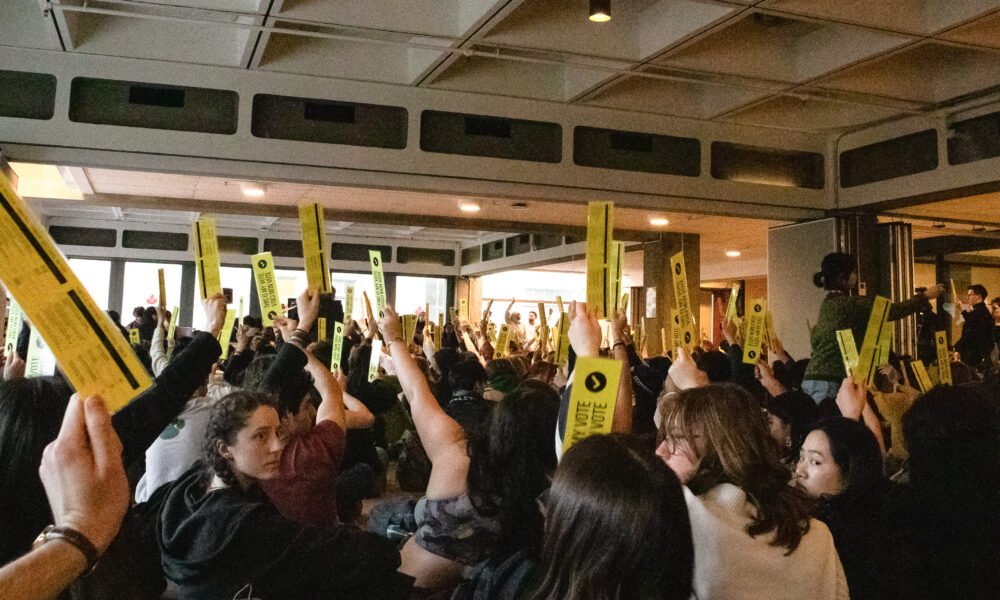Hundreds of students ratified a motion for the Students’ Society of McGill University (SSMU) to strike for Palestine following a Special General Assembly (SGA) on March 27. The SGA exceeded its quorum of 500 students, and the motion passed with 679 in favour and 13 against or abstaining. It was then put to a ratification vote to the SSMU constituency on March 27. Of the 3,933 students who voted, 72 per cent, or 2,731 students, ratified the motion, casting a “Yes” ballot. SSMU members will go on strike April 2-4.
The strike motion asks that students not attend class during the three-day period to call on McGill to accept three demands. The first states that McGill must divest from companies linked to the manufacturing of weapons that the Israeli government uses against Palestinians. The second request is that the university end research partnerships with institutions benefiting from the sale of military technology, and the last demands that the university cease all disciplinary cases currently filed against students involved in advocacy for Palestine. Students for Palestine’s Honour and Resistance (SPHR) at McGill will host programming over the strike period, encouraging students to attend political education and cultural events rather than classes.
At the SGA, the student who submitted the motion gave a five-minute presentation on the strike’s intent. The student—who wished to remain unnamed—began by addressing Israel’s continuation of its genocide of Palestinians since violating the ceasefire agreement on March 18. The violence includes several ground invasions by the Israeli army, which have killed over 1,000 Palestinians. The student also drew attention to Immigration and Customs Enforcement (ICE)’s abduction of student activists across the U.S. The speaker asserted that McGill students have a continued responsibility to demand that the university end participation in military research and funding that goes toward the Israeli occupation in Palestine.
“Students have long been at the forefront of change, leading the charge against the Vietnam War, standing on the front lines of the civil rights movement, and driving the struggle against apartheid in South Africa,” the student said. “We learned from history that students have the power to force the hands of our political class and administrations and that divestment is possible.”
During the question period following their presentation, the speaker noted that students can still submit assignments and attend exams during the strike, but should remain absent from class whenever possible. The student added that they hope that if at least half of undergraduates go on strike, professors will change deadlines and lesson plans to adapt.
SSMU Vice-President (VP) External Affairs Hugo-Victor Solomon told The Tribune that groups across campus have reached out to him to show support for the strike and are preparing to implement measures to accommodate students participating.
“This was a really rare moment of hope,” Solomon said. “We saw that the online registrations exceeded 800, close to 900 in fact [….] Working with the strike petitioners has been a really rewarding process. It’s cool to actually fulfill what SSMU is meant to do, which is be a vehicle to support student democracy and campaign efforts.”
A representative of SPHR, who wished to remain unnamed, emphasized McGill’s role in setting a precedent for other universities in an interview with The Tribune. They hoped that if students ratify the strike motion and pressure McGill to grant its demands, other institutions across North America may be inspired to do the same.
“It’s like a chain reaction,” the representative said. “Which is exactly what happened when McGill divested for South Africa, […] which made […] other universities divest as well, and the apartheid ended due to boycott and divestment.”
Jayden, a GA attendee graduating this year, told The Tribune that the overwhelming student support for the strike marks a newer, stronger wave of mobilization for Palestine than they have seen in the last four years.
“Sometimes, as students, we might feel a little powerless in these circumstances, especially when our tuition is what’s funding this,” Jayden said. “But we’re seeing that so many different faces, so many different cultures, so many different nationalities are coming together and acknowledging that the plight of one person is also our plight. What does it mean about our world if we’re not all trying to thrive for a safer, better, more peaceful world altogether?”









